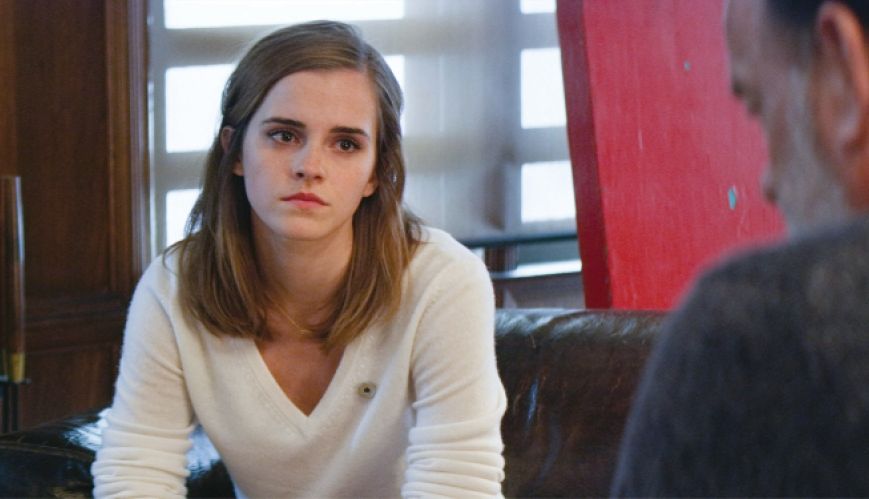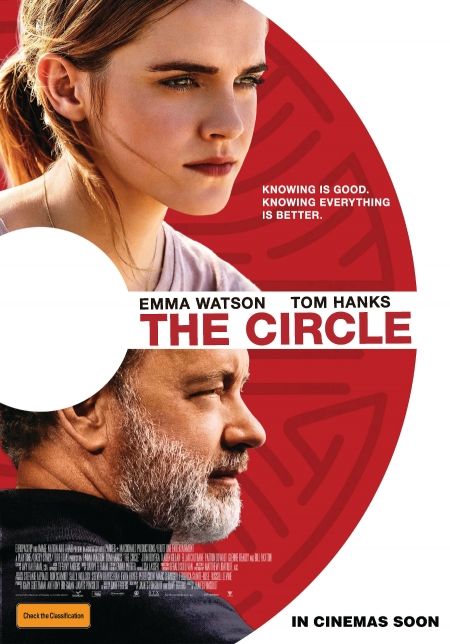The Circle

The Circle
13 July 2017
Mae (played by Emma Watson) is the enthusiastic recruit joining the futurist company The Circle in this tech-thriller.
Richard Leghorn, the founder of the Itek Corporation, was the first person to coin the phrase, “the information age”.
He was reflecting in part about the all-seeing capabilities of the spy cameras manufactured by his company, and the effect such “spectacular informational achievements” would have on revealing the world around us.
He was also writing in 1960. What would he have made of today’s worldwide web?
The internet and its attendant social networks allow us to peer into public and private spaces that would have seemed unbelievable just 20 years ago.
But the new tech-thriller The Circle suggests that however much those advances engage us, there is a point where the free flow of information no longer sets us free.

The Circle is based on the best-selling book of the same name by Dave Eggers. Emma Watson stars as Mae Holland, a college graduate who snares a coveted position at the world’s most advanced technology company.
“The Circle” is a fictional mash-up of present-day tech giants. It embraces diverse technologies like Microsoft, wields a worlddominating social network like Facebook, preaches a juncture of technology and artistry that reflects Apple, and embraces the same free-flowing, creative environment as Google.
Like most technology companies, The Circle is led by a small group of futurists, the key visionary being Eamon Bailey, played by Tom Hanks. With the warmth of a grandfather and the zeal of a prophet, Eamon preaches a free flow of personal and public information that will transform human society.
Complete accountability, he suggests, will allow our “best selves” to emerge. Working at The Circle fans Mae’s enthusiasm for this brave new world, and soon she finds herself being drawn into the ultimate endeavour to make every aspect of human life knowable.
Dave Egger’s vision has enough hooks in today’s information-rich world to make its plotline eerily plausible. The hints towards the dangers of overengagement in social networks are there to see, and the gospel its heroes proclaim could have been drawn from the keynote speeches of Steve Jobs.
Eamon promotes a new range of ultra-portable, ultracheap cameras by asking his new protégé: “So, Mae, do you think you behave better or worse when you’re being watched?”
The answer, of course, is “better”, and the argument that the worldwide introduction of cameras like these could virtually eliminate crime and human rights violations sounds incredibly attractive. Ironically, Christians will know that there is already Someone who witnesses everything we do, and who also records our every transgression.
Our Creator promises to, “... bring every deed into judgement, including every hidden thing, whether it is good or evil,” (Ecclesiastes 12:14), and one day, “... each of us will give an account of ourselves to God,” (Romans 14:12). Yet such warnings have not produced the “endless possibilities” for good that Eamon predicts.
Our potential to complete that circle is forever thwarted by our inner bias towards selfishness. The same can be said for every system that seeks to manufacture holiness through human effort.
Each and every one reckons without the sinfulness of the human heart – a fact this film is well aware of. As The Circle draws to its conclusion, Mae discovers that slogans like “Sharing is Caring” easily give way to “Secrets are Lies” and finally “Privacy is Theft”.
The free flow of information is actually harnessed to suppress rather than empower those who embrace it. It turns out that the motives of the minds behind The Circle are also far from pure. But the Christians in the audience won’t need Dave Eggers to tell them that.
The Circle is rated M and is released in cinemas on 13 July.
Mark Hadley is the culture writer for Others and is one of Australia’s leading Christian communicators